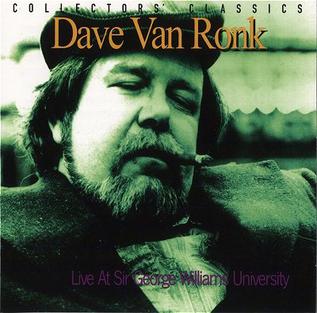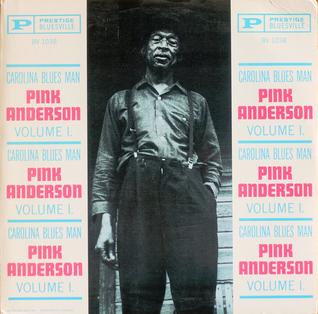
Pinkney "Pink" Anderson was an American blues singer and guitarist.

Reverend Gary Davis, also Blind Gary Davis, was a blues and gospel singer who was also proficient on the banjo, guitar and harmonica. Born in Laurens, South Carolina and blind since infancy, Davis first performed professionally in the Piedmont blues scene of Durham, North Carolina in the 1930s, before converting to Christianity and becoming a minister. After relocating to New York in the 1940s, Davis experienced a career rebirth as part of the American folk music revival that peaked during the 1960s. Davis' most notable recordings include "Samson and Delilah" and "Death Don't Have No Mercy".

Eric Von Schmidt was an American singer and guitarist, songwriter, painter and illustrator, and Grammy Award recipient. He was associated with the folk boom of the late 1950s and early 1960s and a key part of the Cambridge folk music scene. As a singer and guitarist, he was considered to be the leading Cambridge specialist in country blues at the time, thus the Cambridge counterpart of Greenwich Village's Dave Van Ronk. Von Schmidt co-authored with Jim Rooney Baby, Let Me Follow You Down: The Illustrated Story of the Cambridge Folk Years.
"Baby, Let Me Follow You Down" is a traditional folk song popularised in the late 1950s by blues guitarist Eric Von Schmidt. The song is best known from its appearance on Bob Dylan's debut album Bob Dylan.

The Reverend Peyton's Big Damn Band is a three-piece American country blues band from Brown County, Indiana. They play more than 250 dates per year at venues ranging from bars to festivals. To date, they have released ten albums and one EP.

We Free Kings is a studio album by the jazz multi-instrumentalist Roland Kirk, released on Mercury Records in January 1962. His group works through a set of bluesy post-bop numbers, including a highly regarded version of Charlie Parker's "Blues for Alice". The title track, a Kirk composition, is a variation on the Christmas carol "We Three Kings".
Gospel blues is a form of blues-based gospel music that has been around since the inception of blues music. It combines evangelistic lyrics with blues instrumentation, often blues guitar accompaniment.
"You Gotta Move" is a traditional African-American spiritual song. Since the 1940s, the song has been recorded by a variety of gospel musicians, usually as "You Got to Move" or "You've Got to Move". It was later popularized with blues and blues rock secular adaptations by Mississippi Fred McDowell and the Rolling Stones.

Live at Sir George Williams University is a live album by Dave Van Ronk, re-released in 1997. This recording was done live as a joint concert of the folk music societies of McGill and Sir George Williams Universities in 1967, at Sir George Williams University, in Montreal, Quebec, Canada, and also featured Rev. Gary Davis on the same bill.
Bull City Red was an American Piedmont blues guitarist, singer, and predominately washboard player, most closely associated with Blind Boy Fuller and the Reverend Gary Davis. Little is known of his life outside of his recording career.
"Keep Your Lamp(s) Trimmed and Burning" is a traditional gospel blues song. It alludes to the Parable of the Wise and Foolish Virgins, found in the Gospel of Matthew at 25:1-13, and also to a verse in the Gospel of Luke, at 12:35.

Blind Connie Williams was an American blues guitarist who was a street performer beginning in the early 1930s. Williams was something of a journeyman throughout his busking career, but he lived in Philadelphia for most of his life. Much of his repertoire consisted of sanctified gospel songs and pre-war country blues standards. In 1961, Williams had a recording session with the record producer Pete Welding, the results of which were later released on a compilation album.

Harlem Street Singer is a studio album by the American gospel blues singer-guitarist Blind Gary Davis, recorded in 1960 and released on the Bluesville label in December of that year. It features perhaps his best-known song "Death Don't Have No Mercy".

A Little More Faith is an album by blues musician Reverend Gary Davis released on the Bluesville label in September 1961.

Say No to the Devil is an album by blues musician Reverend Gary Davis recorded in 1961 and released on the Bluesville label in August 1962.
The Guitar & Banjo of Reverend Gary Davis is an album by blues musician Reverend Gary Davis recorded in 1964 and released on the Prestige Folklore label.

Carolina Blues Man, subtitled Pink Anderson Volume I, is an album by blues musician Pink Anderson recorded in 1961 and released on the Bluesville label.

The Blues of Pink Anderson: Ballad & Folksinger, subtitled Vol. 3, is an album by blues musician Pink Anderson recorded in 1961 and released on the Bluesville label in 1963.
"Death Don't Have No Mercy" is a song by the American gospel blues singer-guitarist Blind Gary Davis. It was first recorded on August 24, 1960, for the album Harlem Street Singer (1960), released by Prestige Records' Bluesville label during a career rebirth for Davis in the American folk music revival. The recording was engineered by Rudy Van Gelder at his studio in Englewood Cliffs, New Jersey, and produced by Kenneth S. Goldstein, who had pursued Davis in Prestige's effort to capitalize on the revival.












